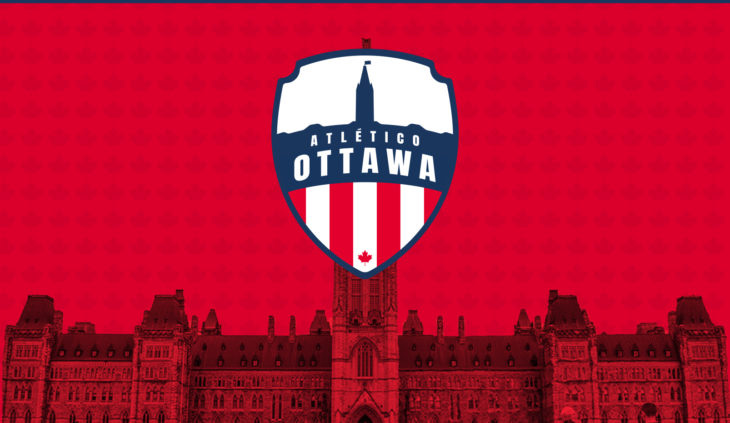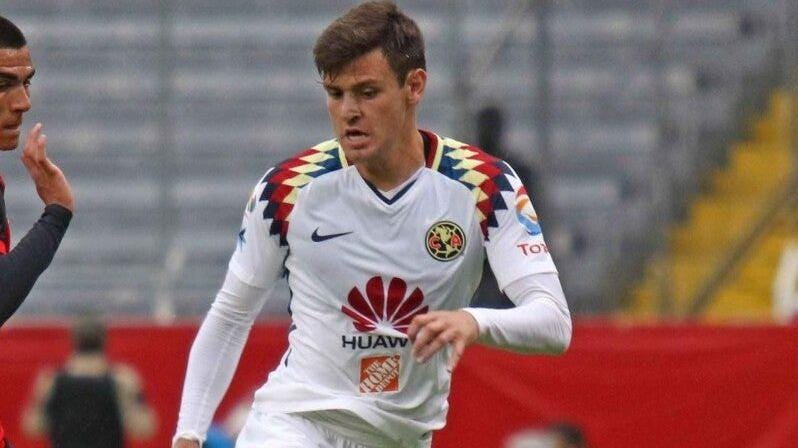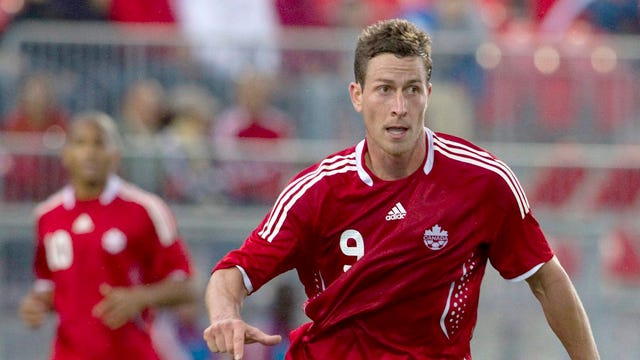🇨🇦 - How the CPL is balancing its Canadian pride with boosting its international image
Atletico Ottawa is only the most visible sign of the growing league's increasing globalization, but it won't sacrifice its original mission.
Happy Canada Day! I got you this story featuring perspective from five different people involved in the fledgling Canadian Premier League, from the league’s commissioner to an ex-CanMNT international who now owns a team.
Thanks for subscribing to this newsletter. We’ll be getting back to a twice-a-week schedule again starting this week, so make sure you’re subscribed to keep getting news and views from the region. If you’re not, you can be! Just stick your email here:
If you are, pass this to a few friends or just drop it in the group chat where you talk soccer. It means a lot.

Image via @AtletiOttawa
When and where the next Canadian Premier League match takes place is still up in the air, but when the ball is rolling again, the second-year CPL will have a much more global bent to it.
That may seem odd for a league that is fiercly Canadian, which says in its marketing materials it is “For Canadians, by Canadians,” and was founded with the explicit purpose of developing local talent in a country where the only professional soccer teams were in a league dominated by teams from the United States.
Yet, it’s exactly what’s happening. The strict roster regulations remain in place. Teams must start at least six Canadians in each match. Three Canadians under 21 have to play a combined 1,000 minutes or more. And there are only seven international spots to fill on 23-man rosters.
That’s why CPL commissioner David Clanachan is sure the league will keep feeling as Canadian as a double-double and some Timbits no matter who owns the teams.
"When I look at a roster of 23 players, 16 of them are going to be Canadian. We have Under-21 minutes required by teams and the reality is we’ve never had a professional league when you think about it,” he said. “So, now younger Canadians have a North Star to aspire to. That’s going to feed the engine, and I’m very, very, very positive about the fact that the game will really grow on steroids as we move forward here.”
But some of that growth may come from outside. The quality and prestige of the typical international player joining the league is increasing notably, and the league’s newest expansion team will look familiar to fans of the global game.
The Atleti influence
When Clanachan unveiled the league’s first-ever expansion club in the nation’s capital, he told them they’d hit the lottery.
After all, there are only so many clubs in Atletico de Madrid’s international profile, and it’s an organization that is serious about development.
“We’re not like Real Madrid, for example, or Manchester United or Bayern Munich, other powers in modern football,” Atletico Ottawa CEO Fernando Lopez said Wednesday, after wishing me a Happy Canada Day. “We don’t have as large of a budget, so what we need to compete with them is to develop players from when they are small. We can’t go into the market and spend 300 million euros on Neymar or 400 million on Mbappe or 200 million on Ronaldo. We’ve got to create those players, and we think that we can do just that in Canada.”

The league also won’t push away the marketing boost. The CPL felt it had strong momentum after the first year and now is looking to expand that profile and improve both the quality of play and its name recognition.
“They know that ultimately, they can’t do it alone and I think it’s interesting they’re attracting international brands who have this experience, although it might not follow this line where you say, ‘Well, the teams are Canadian and want to develop Canadians.’
“What we bring in is a method, the method of how we work and we want to complement Canada’s DNA,” Lopez said.
That doesn’t mean there won’t be some help from outside. Manager Mista already has most of his international slots filled - two by Spaniards but also with a veteran Mexican and a young Jamaican and a young Ghanaian in the mix. But the long-term goals are to develop Canadian players who can become first-team players for the Madrid club.
Not every team will deploy the same strategy. Stephen Hart, the former Trinidad and Tobago and Canada national team manager who currently leads CPL’s Halifax outfit HFX Wanderers, said he’s grateful Atleti is coming into the league but will continue to build on the foundation he built in year one.
“Our model is different. Our ownership, our fan base, our stadium it’s just a different approach, and really and truly it’s no different than any league in the world,” Hart said. “You have some leagues in the world, the injection of what they have is like a steroid while others take a ‘Slowly build it and they will come’ approach. Either way, really and truly, the proof is in the end product.
“Can we deliver a product Canadians can be proud of that our referees can develop, that our communities can develop, that the game can develop? I think that’s the overall priority and if that means the injection of foreign ownership that has experience in a developmental model, I see no problem with that.”
Attracting the stars
The presence of a club operated by Spanish giants isn’t the only foreign flavor on the CPL as it heads into year two. The league also has a number of new players who will be familiar names to Concacaf fans.
Many of those signings came thanks to a partnership with consulting firm 21st Club. With the the cost of global scouting exorbitant for new clubs in a nascent league, teams pooled together to leverage research from 21st Club.
“That partnership we worked out with them as a league to recruit and find young players around the league that maybe are not getting as many first-team minutes as they’d like, and we’ve seen film and stats and medical records and all the things that are there that are very interested in coming to a new league like Canada where they know the eyes of the world are on us because we’re the newest kid on the block,” Clanachan said. “It was not by accident. It was strategy, and what we did was created a way for our clubs to see players that there wouldn’t be enough time in the world for them to go find these players (by) traveling around the world.
“We created a format where we can actually bring the attributes and the players to the clubs and let the clubs decide whether this player or that player fits the style of what they’re trying to build as a club.”
That’s how Alejandro Diaz, the former Mexico youth international and America attacker came onto Pacific FC’s radar.
“I think using a resource like 21st Club and their expertise in the international market and their moneyball style of recruitment as a league pooling our resources together was the agreement that this is the best way to bring in international talent,” said Rob Friend, the former Canada international who now is CEO and co-owner of Pacific FC. “Obviously we know the Canadian talent. We’ve got that under wraps. So we brought them in, and they’ve been first class, honestly. I’d love to take credit for finding a guy like Alejandro, but 21st Club found him.”

It didn’t take much to convince the 24-year-old to sign on as he looked for a change of scenery after a number of loan spells away from Mexico City.
“I think it’s a league where, yes, it just started a year ago but it’s growing really quickly, and I think it’s a really good league,” Diaz said. “You can see it when you look at last season and this year will be much better. I’m happy because the team I came to is top class in all aspects, whether it’s the personnel, on the field, it’s really good.”
While he’s yet to play a CPL match, Diaz hopes he can help raise the level of competition in the league, improving the Canadian players who surround him while also standing out enough to revitalize his career.
“I definitely think a lot of young Canadian talent will come out of the league. That’s why they created the league and play the young players, but you also are going to have more international players coming to the league,” Diaz said.
That’s important for Hart and other managers who are looking to keep their Canadian prospects from resting easy in the fact that they have a starting spot locked up thanks to the roster regulations.
“You have to be in a situation where you don’t want the young potential players not to be in a very competitive situation where they don’t have to fight for places,” Hart said. “I think this is the one aspect of the Canadian player that has been missing in the past, that they really have to compete to get into the starting XI, they really have to compete to stay in the squad. I think this is a very important part of the development process.”
Among other offseason arrivals in the CPL are both Haiti national team center backs Andrew Jean-Baptiste and Jems Geffrard, Peruvian winger Raul Tito, and York9 signing Brazilian forward Gabriel Vasconcelos and bringing Trinidad and Tobago international Ryan Telfer back after a brief swing through Cyprus.
Will it be enough?
The big question is if it works, if the CPL can develop enough players to get the men’s national team to a level at which it is regularly competing for titles in Concacaf and becoming a regular at the World Cup.
Obviously, there are some stars, like Bayern Munich’s Alphonso Davies and Gent’s Jonathan David who are impressing in Europe despite being only 19 and 20 respectively. But Hart points out that there have been talented Canadians playing in Europe who are weren’t able to take the team to the level at which the nation wants to arrive.
“You had De Guzmans going away, you had Paul Stalteri, Atiba Hutchinson, Josh Simpson, Rob Friend, that whole generation of players, Kevin McKenna, etc. going away and making names for themselves in some big leagues. I don’t think they got the recognition they deserved, but they did what a lot of people are praising now,” he said. “Right now, you can say, ‘OK we have a good crop of midfielders and attackers,’ but we really don’t have that many defenders plying their trade at the highest level, so you know I really can’t answer the question with certainty, and I’m kind of taking a wait-and-see approach.”

Friend says he and his teammates didn’t get the recognition they perhaps deserved as players but thinks this national team is “100% more talented” than those teams that failed to get Canada to its first World Cup since 1986 and perhaps fight for its first point on the grandest stage.
The former Borussia Mönchengladbach forward points to Croatia’s runner-up finish at the 2018 World Cup when Croatia fielded a team made up entirely of veterans of the Croatian league.
“Look, the Croatian league isn’t a world-class league, but it’s a great league for players to get in and out.,” Friend said. “That’s how we look at the CPL.
“Is the CPL going to be a world-class league? Probably not, but I think it can be a very strong league where we develop our young players and move them on to much bigger leagues and ultimately have success at the World Cup and the national team levels.”
If Canada can make that jump at the international level, it will be a clear signal that the CPL got the mix of Canadian pride and international exposure exactly right.




